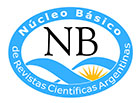About the Journal
Focus and Scope
Throughout its trajectory, of more than 50 years, the journal Desarrollo Económico. Revista de Ciencias Sociales has sought to pursue three core objectives. The first is to promote the advancement of the social sciences through articles and notes grounded in the logical rigor of their arguments and supported by empirical evidence. The second is to provide an outlet for the work of social science researchers in Argentina, with the aim of strengthening the academic community around standards of quality and intellectual relevance. Lastly, it seeks to offer insight into the discussions and debates that periodically shape the social sciences worldwide.Together, these three objectives have supported the journal’s commitment to preserving its original spirit as a multidisciplinary publication.
Founded in the early 1960s, during a period of the modernization of institutionalized social sciences , the journal welcomed contributions from a range of disciplines, including economics, sociology, history, political science, and anthropology. As the process of institutionalization continued, an increasing number of specialized publications emerged. Nevertheless, Desarrollo Económico. Revista de Ciencias Sociales has remained committed to preserving its original mission, staying true to the inspiration of its founders, who saw dialogue across disciplinary boundaries as a source of creativity and a path to a more comprehensive understanding of the social, economic and political realities of our time.
Section Policies
Economic Development - Journal of Social Sciences seeks to promote the advancement of the social sciences through articles and notes grounded in the logical rigor of their arguments and supported by empirical evidence.
Submissions to this section must be original and unpublished works resulting from research. To be accepted and considered for evaluation, the work must not have been included in any other scientific publication or submitted for review elsewhere simultaneously. In turn, articles based on content extensively presented in a previous publication or the form of an already published article -whether in print or electronic format- will not be accepted.
The presentation of the manuscript can be in Spanish or English and must not exceed 12,000 words in length. The file must be in one of the following formats: Microsoft Word, RTF, WordPerfect, or Openoffice. It should use Times New Roman, size 12, double-spaced, and formatted on A4 paper.
The submission must include a title, an abstract (between 120 and 180 words), and up to six keywords, in both Spanish and English.
In certain occasions, the Editorial Committee may decide to include articles on a specific topic to form part of a dossier. These dossiers will have ad hoc editors, who may be members of the Editorial Team or external guests of the journal or institution. Dossier articles must also be original and unpublished, and must comply with the guidelines outlined in the previous paragraph.
Notes and Comments
The journal also accepts texts for review that, while not constituting fully developed academic articles, present discussions of ongoing research (for example, partial findings) or systemize relevant evidence gathered during the research process.
The formatting of these manuscripts should follow the guidelines of the ‘Articles’ section, except that the maximum length is 6,000 words.
Book Reviews
This section includes critical, original, and unpublished review of books published within the last three years. The journal does not accept submissions that merely summarize the contents of a work. The maximum length is 2,600 words.
Manuscript Selection and Peer Review
Manuscripts submitted for publication in Desarrollo Económico. Revista de Ciencias Sociales undergo double revision.
First, the Editorial Committee -composed over the years of social scientists from Argentina’s leading research centers-assesses the relevance of the manuscript according to academic publishing standards, as well as legal requirements related to defamation, copyright infringement, and plagiarism. The principles guiding this review process are political and ideological pluralism, the highest academic rigor, relevance of the topics, primacy of conceptual content over technical virtuosity, and emphasis on an interdisciplinary approach. If the article proceeds to publication, two external reviewers are appointed to evaluate its relevance, internal coherence, originality and the author’s expertise on the subject.
In the second stage, the articles undergo external peer revision using a double-blind system. Each external reviewer will submit a report structured according to the form provided by Desarrollo Económico. Revista de Ciencias Sociales, which considers the article's content, the relevance and clarity of any graphs, tables, and references, as well as the abstract (assessing whether it is aligned with the article’s content). Eventually, the reviewer may, when appropriate, provide suggestions about possible modifications. Selection of the reviewers of a manuscript must not belong to the same university or institution as the author, or have supervised their doctoral thesis. In case of profound discrepancies, the manuscript will be sent to a third reviewer.
Occasionally, the Editorial Committee may invite an author or group of authors to prepare a dossier on a specific topic. In addition, all or some of the articles in the dossier have the potential to be commissioned by the Editorial Committee at the request of the dossier editor.
Likewise, the Committee may authorize the publication of an article previously published abroad when it is deemed to enhance its dissemination at the national level.
The Journal does not charge authors any fees whatsoever for the processing or publication of their work.
Given the prestige and professional activity of the members of the Editorial Board, Desarrollo Económico. Revista de Ciencias Sociales does not prohibit the publication of manuscripts submitted by Board members. In such cases, the journal guarantees the independence of evaluations and ensures that the interested party is excluded from the review process.
Publication Ethics and Plagiarism Guidelines
All submissions to Economic Development. Journal of Social Sciences are assessed solely on the basis of their intellectual content and scientific merit. The Journal does not consider the author’s institutional affiliation, ethnicity, nationality, gender, sexual orientation, religious beliefs, or political philosophy in the review process. External evaluations that introduce personal views or biases into the review process will likewise be disregarded.
If any form of misconduct by the authors is detected during the editorial process or among the published articles (such as citation manipulation, data falsification, or redundant publication), the editors will initiate an investigation to assess the case.
Although the journal does not use anti-plagiarism software, the Editorial Board and external reviewers carefully assess all submissions for potential instances of plagiarism. Plagiarism is defined as the utilization of the text from other sources without the proper citation or as presenting minimally altered text from other sources as one’s own work.
All information about the submitted manuscripts and evaluations are confidential. The members of the journal are committed to not disclosing any information to anyone other than those directly involved in the evaluation process, always respecting the double-blind review system.
The editors guarantee that all the material submitted is reassured and will not be appropriated by the members of the journal without the express written consent of the author/s. Neither will the use of privileged information or the ideas obtained during the review process.
Desarrollo Económico. Revista de Ciencias Sociales adhiere a los Lineamientos para el comportamiento ético en las Ciencias Sociales y Humanidades del CONICET (res. 2857/2006, http://convocatorias.conicet.gov.ar/wp-content/uploads/sites/3/RD-20061211-2857.pdf) y a las pautas dadas por el Committee on Publication Ethics (COPE, http://publicationethics.org/).
Publication Frequency
Desarrollo Económico. Revista de Ciencias Sociales is published three times a year (June, October, and end of December).
Open Access Policy
Desarrollo Económico. Revista de Ciencias Sociales adheres to the Open Archive Initiative (OAI), the emergent standard for providing access to electronic research resources indexed on a global scale.
It provides free, unrestricted, and immediate access to its content via the internet, and does not charge authors any fees for the publication of their work under any circumstances.
The respective standards can be found in: https://www.openarchives.org/
Likewise, the journal is published under license Creative Atribución-NoComerical-Compartirlgual 4.0 international (CC BY-NC-SA 4.0), which allows users to read, download, share, copy, redistribute, adapt and transform the content in any medium or format, provided that the original authorship and source of publication are properly cited and the material is not used for commercial purposes.
For more information: https://creativecommons.org/licenses/by-nc-sa/4.0/deed.es
Copyright Notice
Desarrollo Económico. Revista de Ciencias Sociales is an Open Access publication and does not charge authors any article processing fees (APC), nor does it charge its readers to access the published content. In this framework, the publication uses the Creative Commons license, specifically the Attribution-NonCommerical-ShareAlike 4.0 International (CC BY-NC-SA 4.0) license. For this reason, when a manuscript is approved for publication, the author/s retain the copyright to their work, but authorize others to copy, distribute, and create derivative works from the original, provided the proper attribution is given to author(s) in the manner specified by the the author or the license holder. However, this license does not permit the use of the work or any derivative works for commercial purposes.
For their part, the authors retain the rights to their work and guarantee its original and unpublished nature. Authors also grant Economic Development. Journal of Social Sciences the non-exclusive right to publish their work electronically. Therefore, authors may make use of the final versions of their work and disseminate them through institutional or thematic repositories, personal websites, or any other appropriate channel, provided that the original source of publication is properly cited.
Digital Preservation Policy
Desarrollo Económico. Revista de Ciencias Sociales preserves its digital archives using the LOCKSS system, with the aim of creating permanent archives for conservation, restoration (if necessary), and to facilitate distribution among libraries and digital repositories. To this end, the journal uses PKP Preservation Network (PN), which provides free preservation services for journals managed in OJS.









